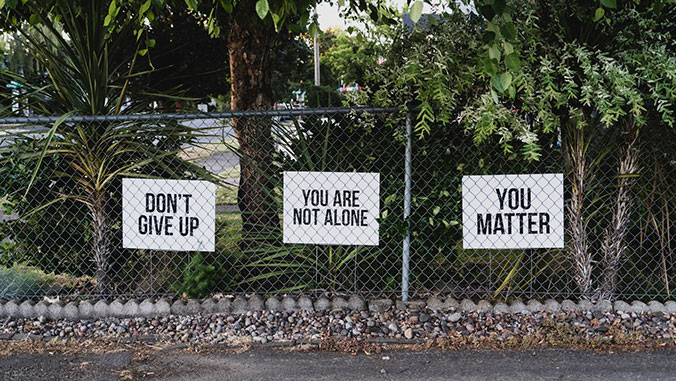
University of Hawaiʻi at Mānoa students and faculty may face new challenges to their mental health during the COVID-19 pandemic. Jeanelle Sugimoto-Matsuda, an associate professor with the Office of Public Health Studies of the Myron B. Thompson School of Social Work and an expert on mental health and suicide prevention, is providing resources to help keep the UH Mānoa campus community safe.
Students who are worried about a fellow classmate, or those in distress themselves, need to know what support is available on campus and in the community. Faculty members also need to care for themselves, and because of their close relationships with students, they may need to provide guidance for students who disclose personal challenges and need support.
“I think about mental health and suicide prevention from a public health perspective,” said Sugimoto-Matsuda, a co-chair of the Prevent Suicide Hawaiʻi Task Force. “Public health is all about prevention, and I want to prevent mental health problems from developing, or catch them as early as possible.”
Helping faculty support students
Sugimoto-Matsuda worked with Professor Deborah Goebert, of the John A. Burns School of Medicine Department of Psychiatry, to create a guide for faculty to support students as well as themselves (PDF). The guide was distributed campus-wide, and the two are now working on promoting mental well-being among faculty members and other campus employees.
“Some students have been very impacted by the pandemic,” Sugimoto-Matsuda said. “For example, they may have had to take on roles as caregivers, or may be living alone and isolated from the social connections that typically help them to stay healthy. Faculty members need training on what to do if they encounter someone in distress, how to acknowledge all of the stressors that everyone is under right now, and how to create accommodations for impacted students.”
The guide for faculty includes a list of tips on validating student reactions, providing honest reassurance and becoming trauma-informed teachers. The guide also includes links to the Centers for Disease Control and Prevention’s guidelines for managing stress and anxiety, resources from Mental Health America of Hawaiʻi, information from the American Foundation for Suicide Prevention and more.
- Related UH News story: Free mental health workshops for UH Mānoa students, May 28, 2020
Invest now
Sugimoto-Matsuda emphasizes the importance of having more resources dedicated to the UH Mānoa Counseling and Student Development Center, and a smoother process when the center refers students to mental health providers in the community, especially in anticipation that the need will continue to grow during the upcoming academic year. Of particular concern are people who did not need mental health services prior to COVID-19, but are now coping with job loss, being isolated from others or suddenly taking on new roles such as being a full-time caregiver.
“Mental health and suicide prevention need to remain top priorities on our campus and across the state,” Sugimoto-Matsuda said. “We need to remind people that mental health is part of the COVID-19 response—it’s part of health. The more invisible impacts of the pandemic—the depression, the anxiety, the feelings of hopelessness that some are experiencing—we need to make those visible.”
“The mental health impacts of this crisis will last a long time, and the price down the line will be high if we don’t invest now. We can’t sweep mental health to the side,” added Sugimoto-Matsuda.
Examples of warning signs for suicide include withdrawing from usual social groups or activities, dramatic mood changes (e.g., feeling hopeless or uncontrollable anger), or talking or writing about death, dying or suicide.
Resources for those struggling with mental health:
UH Mānoa Counseling and Student Development Center (808) 956-7927
Crisis Line of Hawaiʻi (808) 832-3100 (Oʻahu), 1-800-753-6879 (Neighbor Islands)
Crisis Text Line text ALOHA to 741741 (Hawaiʻi), text TALK to 741741 (National)
National Suicide Prevention Lifeline 1-800-273-8255

